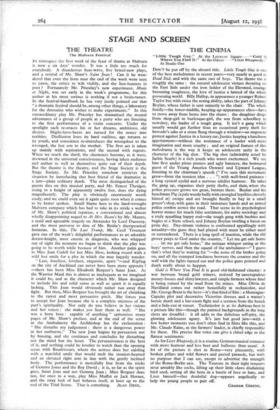The Malvern Festival
STAGE AND SCREEN
THE THEATRE
IN retrospect the first week of the feast of drama at Malvern is now a six days' wonder. It was a little too much for everybody. A thunderous heat-wave, five brand-new plays, and a revival of Mr. Shaw's Saint Joan ! Can it be won- dered that even the lions near the end of the week were seen to yawn, the critics to wilt visibly, and the lion-hunters to pant ? Fortunately Mr. Priestley's new experiment, Music at Night, was set early in the week's prograrrune, for this author at his most serious is nothing if not a brain-teaser. In the festival-handbook he has very justly pointed out that " a dramatic festival should be, among other things, a laboratory for the dramatist who wishes to make experiments." In this extraordinary play Mr. Priestley has dramatised the mental adventures of a group of people at a party who are listening to the first performance of a violin concerto. Under the spotlight each re-enacts his or her dreams, ambitions, old desires. Might-have-beens are turned for the nonce into realities. Disillusion loses its hard outlines, age returns to its youth, and conscience re-introduces the wrongdoer to the wronged, the lost son to the mother. The first act is taken up mainly with aspirations, and the second with regrets. When we reach the third, the characters become, as it were, drowned in the universal consciousness, having taken audience and author as well as themselves quite out of their depth. But the theatre is the theatre, and the Stage Society is the Stage Society. So Mr. Priestley somehow retrieves the situation by introducing that best friend of the dramatist in a jam—plain ordinary death. The most distinguished of the guests dies on this musical party, and Mr. Ernest Thesiger, rising to a height of apparently twelve feet, does the dying magnificently. The play is obviously enormously worth study, and we could even see it again quite soon when it comes to be better spoken. Small blame here to the hard-wrought Malvern company which has had to take in its stride a welter of Mr. Shaw's political repartee, a conventional and almost wholly disappointing sequel to At Mrs. Beam's by Mr. Munro, a staid and agreeable tragedy on Alexander by Lord Dunsany, and the most perverse to date of Mr. Bridie's therapeutical fantasias. In this, The Last Trump, Mr. Cecil Trouncer gave one of the week's delightful performances as an adorable doctor-knight, most caustic in diagnosis, who was whipped out of sight the moment we began to think that the play was going to be worth while because of him. Another palm goes to Miss Jean Cadell for her Miss Shoe, looking round with a wild lost smile for a plot in which she may happily wander.
" Last, loneliest, loveliest, exquisite, apart "—and Kipling on the city of Auckland can never have been more apposite ! —there has been Miss Elisabeth Bergner's Saint Joan. As the Warrior Maid this is almost as inadequate as we imagined it could be, and as the character which Mr. Shaw designed to include fire and solid sense as well as spirit it is equally lacking. This Joan would obviously rather run away than fight. But then, Miss Bergner has brought the art of shrinking to the rarest and most persuasive pitch. She forces you to accept her Joan because she is a complete mistress of the part's spirituality. Not only do you believe in her visions and her voices : she makes you hear them as well. " She was a born boss : capable of anything " epitomises many pages of Mr. Shaw's preface, and at the end of the scene in the Ambulatory the Archbishop has the exclamation : " She disturbs my judgement : there is a dangerous power in her outbursts." The new Joan begins by persuasion not by bossing, and she continues and concludes by disturbing not the mind but the heart. The persuasiveness is the best of it, and nothing could be lovelier to watch than the opening scene with Baudricourt, where the actress does her cajoling with a watchful smile that would melt the stoniest-hearted and an elevated right arm in line with the gently inclined body. The performance is mercifully free from the tricks of Gemma Jones and the Boy David ; it is, so far as the spirit goes, Saint Joan and not Gemma Joan ; Miss Bergner does not, for once in a way, play Miss Muffet or Jack Homer, and the stray lock of hair behaves itself, at least up to the end of the Trial Scene. That is something. ALAN DENT.






































 Previous page
Previous page